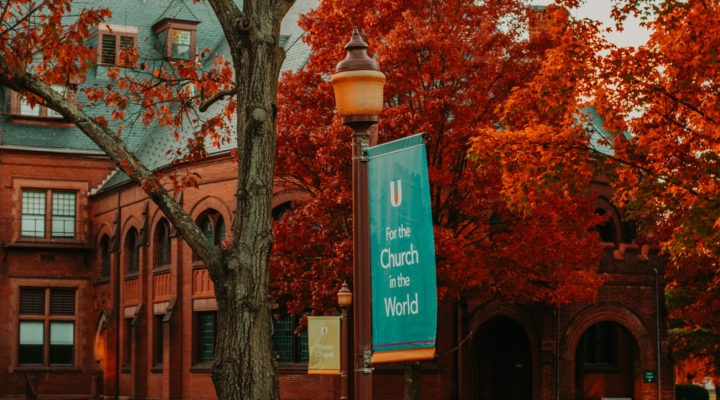The rapidly changing landscape of theological education for moderate and progressive Baptists will take yet another new turn next fall with a focus on Virginia.
Less than two years after the closure of Baptist Theological Seminary at Richmond, two new opportunities were announced Nov. 16 as alternatives.
Union Presbyterian Seminary, which has campuses in Richmond, Va., and Charlotte, N.C., will establish a Baptist House of Studies to serve students who want a traditional classroom experience in a residential campus setting. Baptist Seminary of Kentucky, which offers distance education and has campuses in Georgetown and Louisville, Ky., will welcome Virginia students who wish to learn where they currently live and work.
“This moment requires dynamic collaboration between congregations, ministers, theological schools and our Fellowship.”
“This moment requires dynamic collaboration between congregations, ministers, theological schools and our Fellowship,” said Paul Baxley, executive coordinator of the Cooperative Baptist Fellowship, which has been part of the discussions to create both opportunities.
A six-member advisory team, which will include three representatives from Baptist Seminary of Kentucky and three from Virginia CBF, will guide the development of BSK’s initiatives in Virginia. CBF Virginia also will have representation on BSK’s board.
At Union Presbyterian Seminary, a new Baptist House Advisory Board will offer input and support as the seminary hires a director for the Baptist House, recruits adjunct faculty, engages churches for field education placements and works with seminary administration and trustees to set strategic direction.
Notably, Union Seminary will offer full-tuition scholarships for up to 40 qualified full-time Baptist residential students.
“We yearn to continue BTSR’s legacy of nurturing Baptist leadership.”
“We yearn to continue BTSR’s legacy of nurturing Baptist leadership through the … Baptist House,” said Brian Blount, president and professor of New Testament at Union Seminary. “The presence of the students who will coordinate their studies through the guidance and support of the Baptist House of Studies will enrich an already ecumenical campus presence.”
The idea of a Baptist House at seminaries with other denominational identities is a trend of modern theological education. Duke Divinity School, a Methodist seminary in North Carolina, created a Baptist House of Studies in 1988. One of the most recent Baptist House of Studies to open is at Southern Methodist University’s Perkins School of Theology in Dallas.
Duke’s Baptist House was formed in response to the fundamentalist takeover of the Southern Baptist Convention’s nearby Southeastern Baptist Theological Seminary in the late 1980s. SMU’s Baptist House of Studies got a jump start last year with news of the closing of Logsdon School of Theology at Hardin-Simmons University three hours away in Abilene, Texas.
Since the schism in the SBC that began in 1979 and culminated in the early 1990s, theological education has been at the forefront of innovation among moderate and progressive Baptists disaffected by the fundamentalism of the SBC. The challenge to recruit students and fund operations has been steep, however, because the six SBC seminaries were so well-established and well-funded. Southern Baptist students attend the SBC seminaries for a fraction of the cost charged by most other seminaries and divinity schools.
At least seven new seminaries sprang up to serve moderate and progressive Baptists in response to the schism: Truett Seminary at Baylor University, McAfee School of Theology at Mercer University, Gardner-Webb University School of Divinity, Baptist Seminary of Kentucky, Baptist Theological Seminary at Richmond, Campbell University Divinity School, and the John Leland Center for Theological Studies. Other existing seminaries turned their attention to attract Baptist students, so that the Cooperative Baptist Fellowship today lists 27 recommended seminaries on its website. Of those, 14 participate in a CBF-directed scholarship program.
Until recently, Baptist Seminary of Kentucky had been among the smaller and lesser known of the new seminaries. Founded in 2002, it has been affiliated with CBF since its birth. Its creation was enabled by the severe rightward turn at Southern Baptist Theological Seminary in Louisville in the SBC schism.
Two years ago, BSK forged a relationship with Simmons College of Kentucky, a historic Black institution in Louisville. And earlier this year, BSK became affiliated with the National Baptist Convention of America, International, when the predominantly Black denomination designated BSK as its official seminary. Both partnerships were facilitated by significant investment in distance learning technology before the COVID pandemic hit.
A hallmark of most of the new Baptist seminaries and houses of study has been equal opportunity in education and ministry for women. The SBC seminaries, in contrast, discourage women from preparing for pastoral roles.


